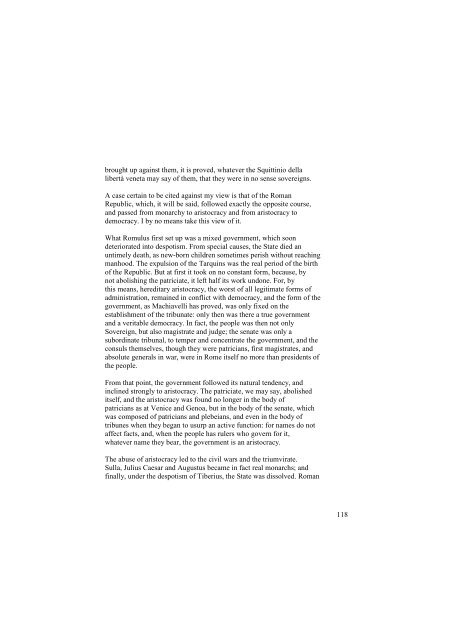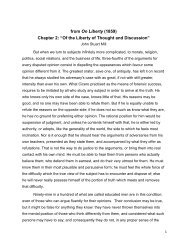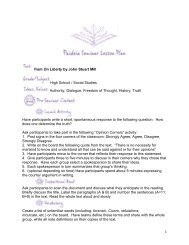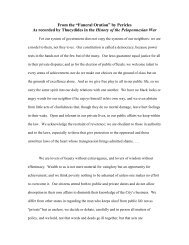Rousseau_contrat-social
Create successful ePaper yourself
Turn your PDF publications into a flip-book with our unique Google optimized e-Paper software.
ought up against them, it is proved, whatever the Squittinio della<br />
libertà veneta may say of them, that they were in no sense sovereigns.<br />
A case certain to be cited against my view is that of the Roman<br />
Republic, which, it will be said, followed exactly the opposite course,<br />
and passed from monarchy to aristocracy and from aristocracy to<br />
democracy. I by no means take this view of it.<br />
What Romulus first set up was a mixed government, which soon<br />
deteriorated into despotism. From special causes, the State died an<br />
untimely death, as new-born children sometimes perish without reaching<br />
manhood. The expulsion of the Tarquins was the real period of the birth<br />
of the Republic. But at first it took on no constant form, because, by<br />
not abolishing the patriciate, it left half its work undone. For, by<br />
this means, hereditary aristocracy, the worst of all legitimate forms of<br />
administration, remained in conflict with democracy, and the form of the<br />
government, as Machiavelli has proved, was only fixed on the<br />
establishment of the tribunate: only then was there a true government<br />
and a veritable democracy. In fact, the people was then not only<br />
Sovereign, but also magistrate and judge; the senate was only a<br />
subordinate tribunal, to temper and concentrate the government, and the<br />
consuls themselves, though they were patricians, first magistrates, and<br />
absolute generals in war, were in Rome itself no more than presidents of<br />
the people.<br />
From that point, the government followed its natural tendency, and<br />
inclined strongly to aristocracy. The patriciate, we may say, abolished<br />
itself, and the aristocracy was found no longer in the body of<br />
patricians as at Venice and Genoa, but in the body of the senate, which<br />
was composed of patricians and plebeians, and even in the body of<br />
tribunes when they began to usurp an active function: for names do not<br />
affect facts, and, when the people has rulers who govern for it,<br />
whatever name they bear, the government is an aristocracy.<br />
The abuse of aristocracy led to the civil wars and the triumvirate.<br />
Sulla, Julius Caesar and Augustus became in fact real monarchs; and<br />
finally, under the despotism of Tiberius, the State was dissolved. Roman<br />
118











